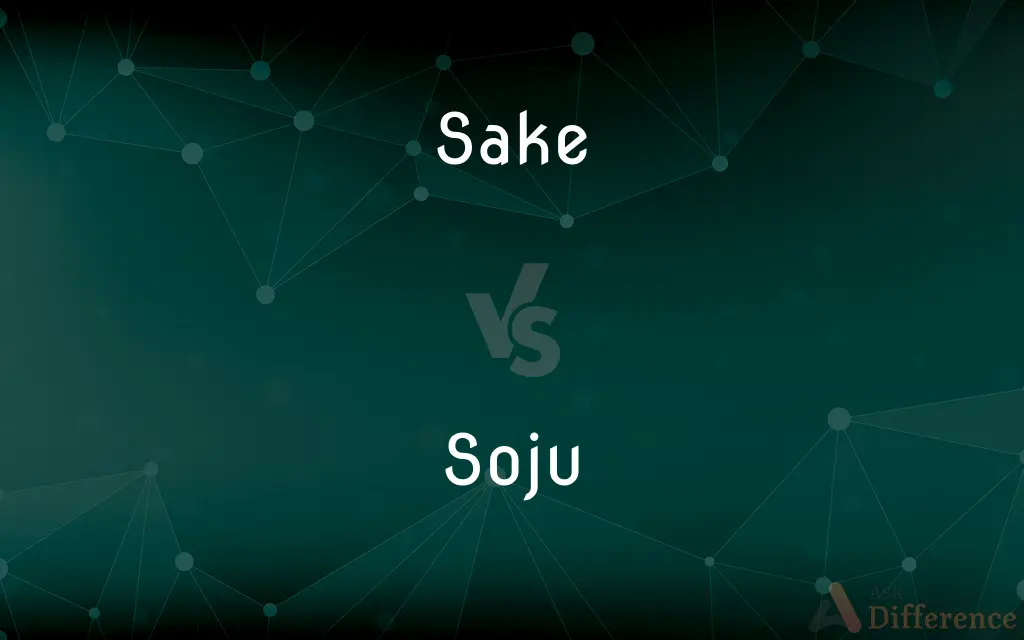Sake vs. Soju — What's the Difference?
By Tayyaba Rehman — Updated on September 21, 2023
Sake is a Japanese rice wine, while Soju is a Korean distilled spirit made primarily from grains or sweet potatoes.

Difference Between Sake and Soju
Table of Contents
ADVERTISEMENT
Key Differences
Sake and Soju are both alcoholic beverages, but they hail from different East Asian countries and have distinct characteristics. Sake, sometimes referred to as "rice wine," originates from Japan. It's produced by fermenting polished rice, with the rice, yeast, and water being its main ingredients. Soju, on the other hand, is from Korea.
Often compared to vodka in its clarity, but with a sweeter taste, Soju undergoes a distillation process and is primarily made from grains like rice, barley, or wheat, and can also be made from starches like sweet potatoes.
Sake tends to have a milder alcohol content, ranging from 13% to 20%, akin to many wines. In contrast, Soju is stronger, with an alcohol content that can vary widely but often sits between 20% to 25%.
Both Sake and Soju have cultural significance in their respective countries, playing roles in various traditional ceremonies and celebrations.
While Sake is often enjoyed warm or cold in ceramic cups, Soju is typically consumed cold in shot glasses and is popularly used in cocktails in the modern drinking scene.
ADVERTISEMENT
Comparison Chart
Origin
Japan
Korea
Primary Ingredient
Polished rice
Grains or sweet potatoes
Production
Fermentation
Distillation
Alcohol Content
13% to 20%
20% to 25% (can vary)
Cultural Significance
Important in Japanese rituals and celebrations
Central to Korean social and celebratory gatherings
Compare with Definitions
Sake
Can be served both warm and cold.
The Sake was heated to the perfect temperature for the winter evening.
Soju
A clear Korean distilled spirit.
He mixed Soju with beer for a refreshing cocktail.
Sake
A Japanese alcoholic drink made from fermented rice.
She ordered a bottle of premium Sake to complement the sushi.
Soju
Often made from grains or sweet potatoes.
The sweet potato-based Soju had a distinct taste.
Sake
Has a smooth, complex flavor profile.
The Sake paired beautifully with the light flavors of the sashimi.
Soju
Has a higher alcohol content than most wines and Sake.
They sipped the Soju slowly, given its strong potency.
Sake
Often termed "rice wine" in the West.
He had a taste for Sake after visiting Japan.
Soju
Commonly consumed in shot glasses.
He poured everyone a shot of Soju to toast the occasion.
Sake
Contains alcohol levels similar to wine.
She preferred Sake over stronger spirits because of its milder potency.
Soju
A staple in Korean nightlife and celebrations.
Soju is often a must-have during Korean karaoke nights.
Sake
Sake, also spelled saké ( SAH-kee, SAK-ay, also referred to as Japanese rice wine), is an alcoholic beverage made by fermenting rice that has been polished to remove the bran. Despite the name Japanese rice wine, sake, and indeed any East Asian rice wine (such as huangjiu and cheongju), is produced by a brewing process more akin to that of beer, where starch is converted into sugars which ferment into alcohol, whereas in wine, alcohol is produced by fermenting sugar that is naturally present in fruit, typically grapes.
Soju
Soju (; from Korean: 소주; 燒酒 [so.dʑu]) is a clear, colorless distilled alcoholic beverage of Korean origin. It is usually consumed neat, and its alcohol content varies from about 16.8% to 53% alcohol by volume (ABV).
Sake
Purpose; motive
A quarrel only for the sake of argument.
Soju
A Korean liquor usually distilled from rice.
Sake
Advantage; good
For the sake of his health.
Soju
A Korean distilled alcoholic beverage, similar to shochu.
Sake
Personal benefit or interest; welfare
For her own sake.
Sake
A Japanese alcoholic beverage made from fermented rice.
Sake
Cause, interest or account
For the sake of argument
Sake
Purpose or end; reason
For old times' sake
Sake
The benefit or regard of someone or something
Sake
Contention, strife; guilt, sin, accusation or charge
Sake
Final cause; end; purpose of obtaining; cause; motive; reason; interest; concern; account; regard or respect; - used chiefly in such phrases as, for the sake of, for his sake, for man's sake, for mercy's sake, and the like; as, to commit crime for the sake of gain; to go abroad for the sake of one's health.
Moved with wrath and shame and ladies' sake.
I will not again curse the ground any more for man's sake.
Will he draw out,For anger's sake, finite to infinite?
Knowledge is for the sake of man, and not man for the sake of knowledge.
Sake
A traditional alcoholic drink of Japan. It is made from rice.
Sake
A reason for wanting something done;
For your sake
Died for the sake of his country
In the interest of safety
In the common interest
Sake
Japanese alcoholic beverage made from fermented rice; usually served hot
Sake
The purpose of achieving or obtaining;
For the sake of argument
Common Curiosities
Can you mix Soju in cocktails?
Yes, Soju is versatile and often used in various cocktails.
Which country is Soju native to?
Soju is a traditional alcoholic beverage from Korea.
How is Soju typically consumed in Korea?
Soju is often consumed in shot glasses and is a staple in Korean social gatherings and celebrations.
How does the alcohol content of Soju compare to Sake?
Soju generally has a higher alcohol content than Sake, often between 20% to 25%.
Are there flavored versions of Soju available?
Yes, flavored Soju varieties, like green apple or grapefruit, are quite popular.
What makes Sake unique from other alcoholic beverages?
Sake's unique fermentation process and the use of polished rice give it a distinct flavor and character.
What is the main ingredient in Sake?
The primary ingredient in Sake is polished rice.
Is Sake similar to white wine?
While Sake is sometimes termed "rice wine," its production process and flavor profile are unique, distinguishing it from grape wines.
How is the flavor of Sake compared to Soju?
Sake often has a smoother, more nuanced flavor, while Soju is clearer with a slightly sweet undertone.
What grains can Soju be made from?
Soju can be made from various grains including rice, barley, or wheat, and also from starches like sweet potatoes.
Is Sake always served warm?
No, Sake can be served both warm and cold, depending on the type and personal preference.
Is it true that there's a ceremonial way to pour Soju?
Yes, in Korean culture, it's customary to pour Soju for others, not for oneself, using both hands.
Is Sake only consumed in Japan?
While Sake originates from Japan, it's enjoyed worldwide, especially in sushi restaurants and specialty bars.
Can both Sake and Soju be used for cooking?
Yes, both Sake and Soju can be used in cooking to enhance flavors, especially in marinades and sauces.
Share Your Discovery

Previous Comparison
Drive vs. Crankshaft
Next Comparison
Synthetic vs. SyntheticalAuthor Spotlight
Written by
Tayyaba RehmanTayyaba Rehman is a distinguished writer, currently serving as a primary contributor to askdifference.com. As a researcher in semantics and etymology, Tayyaba's passion for the complexity of languages and their distinctions has found a perfect home on the platform. Tayyaba delves into the intricacies of language, distinguishing between commonly confused words and phrases, thereby providing clarity for readers worldwide.














































